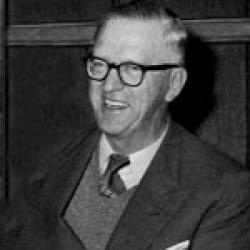
Published date
5 December 1894
Charles Robberts Swart was born on a farm in the Winburg district of the Orange Free State (OFS) on 5 December 1894. Part of his childhood was spent in a concentration camp during the Anglo Boer War. This did not deter him from excelling academically. After having matriculated at the age of thirteen, Swart went on to complete a B.A. degree in two years at Grey University College in the OFS. He then worked as a teacher in Ficksburg, where he was also involved in the 1914 Rebellion. After serving his sentence for his role in the rebellion, Swart pursued his love of law, and obtained an LL.B degree. He began practicing as an advocate in the Bloemfontein Supreme Court in 1919.
Later, Swart completed a diploma in journalism at the University of Columbia in the United States, and soon after became involved in politics. As a member of the National Party (NP), he won a seat for Ladybrand in the parliamentary election. When the fusion between the NP and South African Party (SAP) took place, Swart joined Malan's break-away party, the (Purified) Gesuiwerde National Party (GNP). He was also a member of the Afrikaner Broederbond (AB) and the Ossewa-Brandwag (OB), both of which he joined due to his strong conviction that Afrikaner unity needed to be maintained. Swart played a major role in the launching of the Herenigde (Reunited) Nasionale Party (HNP), which was later to emerge as the National Party (NP).
In 1941, Swart was once again elected as a Member of Parliament and became Minister of Justice when the NP won the 1948 election. In this capacity, Swart played a great role in furthering the policy of apartheid. He was instrumental in the passing of the Immorality Act, the banning of the South African Communist Party (SACP) and the banning of various African National Congress (ANC) members. In 1961, Swart became the first state President of the Republic of South Africa, a position he held for six years. Thereafter he retired from politics and died in 1982.
Often referred to by his nickname 'Blackie', Charles Robberts Swart left a noticeable imprint on public life in South Africa. Although a larger part of his contribution fueled an unjust system, he can also be credited with a number of literary and journalistic achievements.
References
SAHO Charles Robberts (Blackie) Swart [online] Available at: www.sahistory.org.za [Accessed on 28 December 2013]
[Accessed 30 November 2009]|erwey, E.J. (ed)(1995). New Dictionary of South African Biography, v.1, Pretoria: HSRC|Wallis, F. (2000). Nuusdagboek: feite en fratse oor 1000 jaar, Kaapstad: Human & Rousseau.